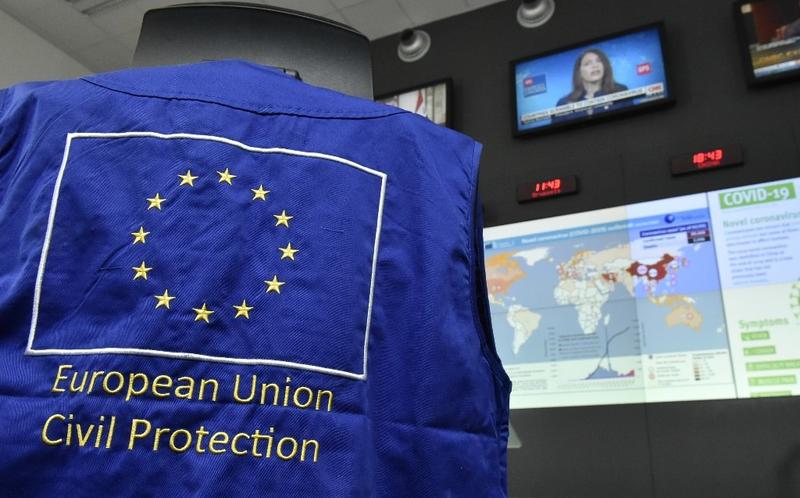 This March 2, 2020 photo, shows a screen with a graphic updates on the progress of the coronavirus COVID-19 outbreak around the world, during a press conference held at the Emergency Response Coordination Centre in Brussels, on the EU response to COVID-19. (JOHN THYS / AFP)
This March 2, 2020 photo, shows a screen with a graphic updates on the progress of the coronavirus COVID-19 outbreak around the world, during a press conference held at the Emergency Response Coordination Centre in Brussels, on the EU response to COVID-19. (JOHN THYS / AFP)
BRUSSELS - A pan-European approach for COVID-19 mobile apps should be drawn up by April 15, the EU said in new proposals aimed at using virus-tracking digital tools safely and more effectively.
“As a matter of urgency” the 27 EU nations should develop common standards for virus-tracking technologies, according to recommendations signed off by the European Commission on Wednesday.
“As a matter of urgency” the 27 EU nations should develop common standards for virus-tracking technologies, according to recommendations signed off by the European Commission on Wednesday
Measures should be aimed at making the apps interoperable and nations should even potentially develop a single app across the bloc, the EU’s regulatory arm, said in the document.
As countries across the EU have been grappling with surging infection and death rates, the bloc’s stringent data-privacy rules have been stretched to their limits amid efforts to stem the spread of the new coronavirus.
The proposal puts “in motion a European coordinated approach for the use of such apps and data, without compromising on our EU privacy and data protection rules, and avoiding the fragmentation of the internal market,” EU Industry Commissioner Thierry Breton said in a joint statement with Justice Commissioner Didier Reynders.
With developers in the UK, Germany and elsewhere working on mobile phone apps to track people who’ve been exposed to the coronavirus, the EU is looking to establish common standards that would make the data more comparable. The benchmarks for contact tracing apps are part of a broader effort by the EU to coordinate exit strategies when member states slowly lift existing lock-down measures.
The EU’s efforts to combat the virus “are hampered by the current fragmentation of approaches,” according to the commission document.
But the EU is also concerned about privacy violations from apps that generate too much data about where people go. In some countries, geolocation-based tracking of individuals and centralization of sensitive data, “raise questions from the viewpoint of several fundamental rights and freedoms.”
Virus-tracking apps could help authorities find people who have been exposed to COVID-19 so they can be isolated
READ MORE: Report: EU commissioners, Spain urge common debt plan
This is the first global crisis “where the full power of technology can be deployed and offer efficient solutions,” Vera Jourova, a commission vice-president who previously helped draw up the EU’s tough privacy laws, added in a separate email. She said she supports a European approach “in line with our fundamental rights.”
Virus-tracking apps could help authorities find people who have been exposed to COVID-19 so they can be isolated and may ultimately lead to a way out of the restrictive social-isolation measures that are keeping schools, shops and restaurants closed.
ALSO READ: EU fails to agree on 500b-euro response to virus crisis
While apps may be more precise than aggregated data in pin-pointing potential contagions, they are being released on a voluntary basis to meet strict EU privacy rules. Researchers say they need to be adopted widely in order for an app to be helpful in tracking the virus, which may prove a challenge if people are wary of providing location information to governments or other organizations running the apps.
Consulting with the bloc’s data protection authorities “is essential to ensure that personal data is processed lawfully and that the rights of the individuals concerned are respected,” the European Commission says in the draft recommendations.


